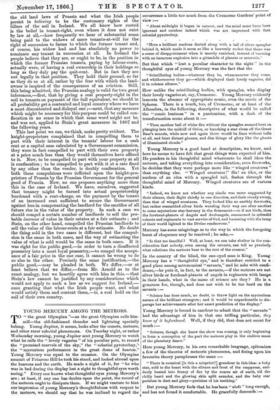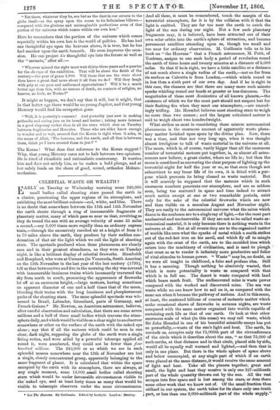YOUNG MERCURY AMONG THE METEORS.
To "the great Olympian "—as the great Olympian calls him- self—the old-fashioned thunder and lightning specially belong. Young Jupiter, it seems, looks after the comets, meteors, and other rarer celestial phenomena. On Tuesday night, or rather Wednesday morning, young Jupiter sent young Mercury to watch what he calls the "lovely vagaries " of his peculiar pets, to record the "promised marvels of the sky," the "celestial pyrotechny,', the "mysterious performance in the great dome of heaven." Young Mercury was equal to the occasion. On the Olympian summit of Primrose Hill he took his stand, and looked abroad upon the heavens and the earth. He made a night of it, for "he who was in bed during the display lost a sight to thoughtful eyes worth seeing." Every one knows what thoughtful eyes young Mercury's are ; at least, if any one has doubts upon the point, the record of the meteors ought to dissipate them. If we might venture to hint our impression of young Mercury's thoughtfulness with respect to the meteors, we should say that he was inclined to regard the occurrence a little too much from the Cremorne Gardens' point of view :— " About midnight it began in earnest, and the mind must have been ignorant and careless indeed which was not impressed with that celestial pyrotechny.
• • • • "Here a brilliant nucleus darted along with a tail of silver spangles' behind it which made it seem so like a heavenly rocket that there was a sense of disappointment when it merely vanished, instead of bursting with an immense explosion into a girandole of planets or asteroids."
But that which "lent a peculiar character to the sight" in the thoughtful eyes of young Mercury was the fact that the
"Scintillating bodies—whatever they be, whencesoever they come, and whithersoever they go—which displayed their lovely vagaries, did it in solemn silence."
How unlike the scintillating bodies, with spangles, who display their lovely vagaries at, say, Cremorne. Young Mercury evidently laments the absence of appropriate music, even the music of the Spheres. There is a touch, too, of Cremorne, or at least of the Alhambra, in the following, descriptive of what would be called the "comic business" in a pantomime, with a dash of the' transformation scene about it :--
" Then another ball of white fire without the spangles seemed bent on plunging into the midriff of Orion, or knocking a star clean off the Great Bear's muzzle, while now and again there would be lines without balls at all, and faint distant gleams, and dim things of glory like the ghosts of illuminated clouds."
Young Mercury is a good hand at description, we know, and here he seems to have felt that great things were expected of him. He ponders in his thoughtful mind whereunto he shall liken the meteors, and taking everything into consideration, even fireworks, he decides that they were perhaps more like "winged creatures" than anything else. "Winged creatures !" Ha! an idea, or the nucleus of an idea with a spangled tail, flashes through the thoughtful mind of Mercury. Winged creatures are of various kinds.
"Indeed, we know not whether any simile was more suggested by their silence, their flight chiefly in one direction, and their steady sweep, than that of winged creatures. They looked like no earthly fireworks, but rather resembled silver birds wending their way one after another to some mysterious star-heronry in the firmament—or if not birds, then the forehead-planets of Angels and Archangels, summoned in splendid cohorts and regiments to vast service of God, and hastening with the lamp of their world lighted to the Divine rendezvous."
Mercury has some misgivings as to the way in which the foregoing burst of eloquence may be received ; he asks,—
" Is that too fanciful ? Well, at least, we can take shelter in the con- sideration that nobody, even among the savants, can tell us precisely, what relations the meteors bear to the rest of the cosmos."
In the country of the blind, the one-eyed man is King. Young: Mercury has a "thoughtful eye," and is therefore entitled to a good place among astronomical "savants," and he asks with confi- dence,—he puts it, in fact, to the savants,—if the meteors are not silver birds or forehead-planets of angels in regiments with lamps. in their hands, what in the name of science are they? He is a. generous foe, though, and does not wish to be too hard on the savants :— "Science has done much, no doubt, to throw light on the mysterious nature of the brilliant strangers ; and it would be unpardonable to dis- parage her achievements after her exact prediction of the display."
Young Mercury is bound in candour to admit that the " savants " had the advantage of him in that one trifling particular, they knew of it beforehand. Well, if they did, that does not count for much :— "Science, though she knew the show was coming, is only beginning to form a conception of the part the meteors play in the endless maze of the planetary dance."
Here young Mercury, in his own remarkable language, epitomizes a few of the theories of meteoric phenomena, and fixing upon his favourite theory paraphrases the same :— " There is cosmical [is this a misprint?] grandeur in this idea: a baby star, cold to the heart with the silence and frost of the empyrean, sud- denly heated into frenzy of fire by the coarse air of earth, till the chilly heart and the glowing skin split asunder, and the baby star perishes in dust and glory—perishes of his teething."
But young Mercury feels that he has been " aloft " long enough, and has not found it comfortable. He gracefully descends :—
"Yet these, whatever they be, are but as the dust in our streets to the globe itself—as the spray upon the ocean to its fathomless billows— compared with the glorious and unimaginable perfections even of that portion of the universe which comes within our oven ken."
Here he remembers that the portion of the universe which comes especially within his own ken is the world of politics. He has had one thoughtful eye upon the heavens above, it is true, but he has had another upon the earth beneath. He even improves the occa- sion. He can project his thoughtful eye into the future as well as the "savants," after all :— " Whoever missed the sight must wait thirty-three years and a quarter for the do capo of the exhibition. That will be about the finish of the century—the year of grace 1,900. Will those that see the stars shoot then know a great deal more about it all than we do ? Will they laugh with pity at our poor and uniformed appreciations ? Will it be a much better age than this, with no terrors of death, no contests of religion, no knaves, no fools, no Tories ?"
It might so happen, we don't say that it will, but it might, that in that better age there would be no young Jupiter, and that young Mercury would find his occupation gone.
"Well, it is posterity's concern ! And posterity just new is making pothooks and eating jam on its bread and butter ; taking more interest in a good sixpenny rocket than in all the stars which shot on Tuesday between Sagittarius and Hercules. Those who are older know enough to wonder and to wait, assured that the Koran is right when it asks, in the name of Allah, The heavens, and the earth, and all that is between them, think ye I have created them in jest ?' "
The Koran ! What does that reference to the Koran suggest ? Why, that young Mercury cares not to halt between two opinions. He is tired of ritualistic and rationalistic controversy. It worries him and does not satisfy him, so he makes a bold plunge, and at last safely lands on the shore of good, sound, orthodox Moham- medanism.































 Previous page
Previous page